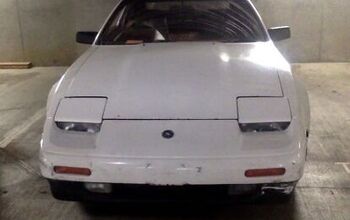2013 BMW 3-Series Wagon Coming Here: Will We See A Diesel Stick-Shift?
Even as the wagon Gods smile down upon on this Mother’s Day, BMW’s announcement of an all-new 2013 3-Series Wagon still has us waiting with bated breath with the announcement of not one but two diesel powertrains.
We will almost certainly get the 328i, with the controversial turbo 4-cylinder engine, but BMW also announced a 320d and 330d. A 335i is conspicuously absent, but with two torquey oil-burners, who cares? The 320d, with 181 horsepower and 280 lb-ft of torque returns 52 mpg. A 330d with 250 horsepower and 358 lb-ft of torque will also be offered, but BMW is being coy, stating that American spec models will be announced at a later date.
What will be offered is xDrive all-wheel drive, all the usual overwrought F30 3-Series gadgets, and a power tailgate similar to the 2013 Ford Escape, that can be opened be sweeping your foot underneath the rear bumper. And no, we’re not sure if the diesels will get a stick shift. The 328i will surely get a 6-speed manual as well as the 8-speed T1000 Cyborg Automatic.
More by Derek Kreindler
Latest Car Reviews
Read moreLatest Product Reviews
Read moreRecent Comments
- Theflyersfan The wheel and tire combo is tragic and the "M Stripe" has to go, but overall, this one is a keeper. Provided the mileage isn't 300,000 and the service records don't read like a horror novel, this could be one of the last (almost) unmodified E34s out there that isn't rotting in a barn. I can see this ad being taken down quickly due to someone taking the chance. Recently had some good finds here. Which means Monday, we'll see a 1999 Honda Civic with falling off body mods from Pep Boys, a rusted fart can, Honda Rot with bad paint, 400,000 miles, and a biohazard interior, all for the unrealistic price of $10,000.
- Theflyersfan Expect a press report about an expansion of VW's Mexican plant any day now. I'm all for worker's rights to get the best (and fair) wages and benefits possible, but didn't VW, and for that matter many of the Asian and European carmaker plants in the south, already have as good of, if not better wages already? This can drive a wedge in those plants and this might be a case of be careful what you wish for.
- Jkross22 When I think about products that I buy that are of the highest quality or are of great value, I have no idea if they are made as a whole or in parts by unionized employees. As a customer, that's really all I care about. When I think about services I receive from unionized and non-unionized employees, it varies from C- to F levels of service. Will unionizing make the cars better or worse?
- Namesakeone I think it's the age old conundrum: Every company (or industry) wants every other one to pay its workers well; well-paid workers make great customers. But nobody wants to pay their own workers well; that would eat into profits. So instead of what Henry Ford (the first) did over a century ago, we will have a lot of companies copying Nike in the 1980s: third-world employees (with a few highly-paid celebrity athlete endorsers) selling overpriced products to upper-middle-class Americans (with a few urban street youths willing to literally kill for that product), until there are no more upper-middle-class Americans left.
- ToolGuy I was challenged by Tim's incisive opinion, but thankfully Jeff's multiple vanilla truisms have set me straight. Or something. 😉









































































Comments
Join the conversation
performance results speak for themselves in Le Mans winners: http://www.popularmechanics.com/cars/alternative-fuel/diesel/le-mans-diesel-winners Imagine a racing fan who suffers a coma-inducing trauma in 2002. After peacefully sleeping for eight years, our fan awakens clear-headed and realizes it's time to turn on the television in his recovery room to watch the French road-racing classic. He marvels at the assembled grid for the 2010 Le Mans. He quips that the 911s still look the same, and he recognizes the Aston Martins. All is well until he hears that the front-running prototypes are all diesel-powered. The shock is nearly enough to send him back into a comatose state. How did this happen? What changed in the world of racing that diesels are winning at Le Mans? The big picture in endurance racing is that there are five main contributing elements to winning; fuel economy, tire performance, weather, traffic and a bit of luck. The latter three elements can't be controlled, leaving auto manufacturers to focus on the former two. Of these, the carmaker can only genuinely affect fuel economy since tire performance is the responsibility of independent tire makers. How Manufacturers Found Diesel It was one manufacturer's recognition of the importance of fuel economy that changed everything. Audi decided to look at how to improve their vehicles' average speed at endurance events, and deduced that fewer fuel stops would be an integral key. Among the solutions was efficient diesel power. There was one big hurdle to overcome, however: Would the rules allow oil burners on the famed circuit in Sarthe, France? To answer this question, you just need to look back when Penske Racing looked at the rules for the 1994 Indianapolis 500. Back then, Penske discovered that it was legal to run high boost levels on big-cube pushrod engines. The company made changes to its cars and trounced the competition that year. Similarly, Audi looked at the rules for Le Mans and saw caps on displacement but open rules regarding combustion cycles. "Diesels could always run at Le Mans," says Scot Elkins, Vice President of Operations at the American Le Mans Series. "One of the great things about their rules package is that it allows for creative solutions," he says. "It's not at all like spec engine series. Audi was simply the first to realize what the rules allowed." After fielding the gasoline-powered R8R and R8 prototype racers beginning in 1998, Audi sought a better solution. While its direct-injected gasoline engines were more efficient than engines with port fuel injection, Audi was after even more efficiency. It's not that the R8 was not successful. In fact, it was the most successful Le Mans prototype ever. In 2004, the gasoline-powered, turbocharged and direct-injected 3.4-liter R-8 took the pole and later the checkered flag in 2004 with a fastest lap of 3 minutes 34.264 seconds, averaging 142.49 mph. Introducing the R10 The 2005 season would be the R8's last full competition docket, supplanted by the car that stood endurance racing on its ear. The new Audi prototype was the R10, a V12, twin-turbocharged, direct-injected diesel. For the 2005 and 2006 seasons, the 5.5-liter engine produced 650 hp and 737 lb-ft of torque. The results were almost immediate, proving that diesels could win at Le Mans. Audi pilot Rinaldo Capello put an R10 on the 2006 Le Mans pole with a 3:31.211 lap at 144.57 mph. While lap speeds for the diesels weren't considerably faster than those of the gasoline-powered cars they replaced, the diesels could go longer between fuel stops. The R10 went on to win the 24 Hours of Le Mans in 2006, 2007 and 2008. The R10 featured Audi's TDI diesel engine technology (turbocharged direct injection). According to Dr. Ullrich Baretzky, the Head of Audi Motorsports Engine Development, what Audi learns on the track has an influence on its production vehicles. For example, Baretzky told PM, "fuel-injection pressure levels are key to engine efficiency. In 2004, when we started the development of the R10, our diesel road cars had an injection pressure of 1600 bar," he says. "We are now running over 2200 bar in the R15, and our road cars, starting in 2008, used increased pressures of 2000 bar. It took only four years for what we learned on the racetrack to be in our diesel road cars," Baretzky says, "And the process continues." Catching On to the Quiet Efficiency of Diesels The efficiency of the diesel helped Audi win, but Peugeot was quick to recognize Audi's plans. The French manufacturer is among the world's leaders in clean-diesel technology and began a diesel racing program that showed well at Le Mans in 2008 and won in 2009. Meanwhile, Audi introduced the R15, its second-generation diesel racer. Audi attempted to make the R15 lighter, more aerodynamic and faster. "By eliminating two cylinders," Baretzky said, "we were able to shorten the engine by 10 mm. This aided in a 10 percent weight reduction and better aerodynamics because of the smaller engine package." The 90-degree 5.5-liter V10 makes nearly identical power to the V12. For those who have heard the R10 or R15 at the track, their eerie quietness at wide-open throttle is a curiosity. This, Ullrich says, is a sign of the R15's efficiency. "Some people have the imagination that a race car should be loud, but that noise is wasted energy. The turbochargers capture the maximum amount of energy coming out of the exhaust and put it to use." Even the twice-spent exhaust flow is useful—the exhaust tips exit out the top of the engine compartment and are directed at the rear wing to generate additional downforce. The diesels are quiet as well as smoke-free. The Audi R15 runs on a special form of gas-to-liquid (GTL) diesel refined from natural gas by Shell Oil in Malaysia. The GTL is a particularly clean-burning diesel, and the remaining exhaust is scrubbed by two particulate filters. Many see GTL as a precursor to the process that may be used to synthesize biofuels from algae or waste products. How the Drive Differs Diesels do drive differently than gasoline-powered cars. Low revs are characteristic of diesel engines, with the R15's top rpm being in the range of 5000. Torque is also greater at lower rpms, and this makes for a different driving style. Pilots in diesel racers shift less often than in gasoline-fueled cars. The torque curves of diesels also change the way some drivers exit corners, because so much torque is available. We asked Audi driver Alan McNish about what it is like to drive the R15. Compared to the R10, "it's a whole new ballgame," McNish says. "It's much more on its toes compared to the R10 and the R15 is more refined, not as much of a beast," he says. "I can do a lot more with it because the balance is so much better." As the once-comatose patient watches the 2010 running of Le Mans, he may realize that diesels rule in the French countryside—they make adequate power yet burn less fuel. The racing programs are supported by manufacturers who have a stake in seeing diesel succeed, and their related consumer-oriented vehicles benefit from the racing effort. Now the only question is: Who will win, Audi or Peugeot? Read more: Diesels From Audi and Peugeot at Le Mans - Why Audi and Peugeot Diesels Rule the Le Mans Raceway - Popular Mechanics
Screw Diesel! The pertinent question is, will there be a wagon bodied F30 M3?